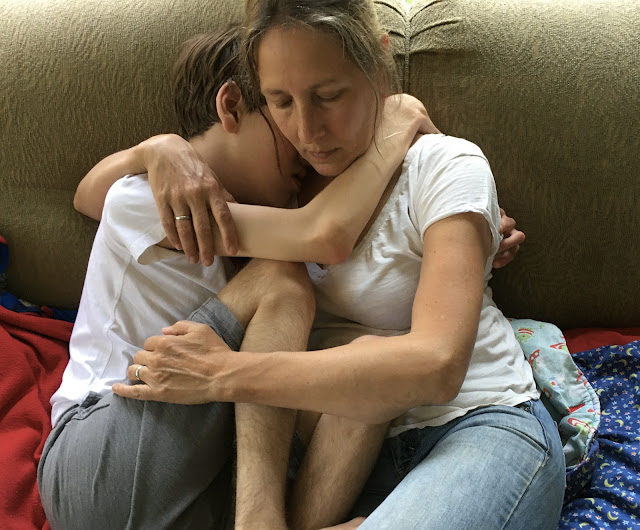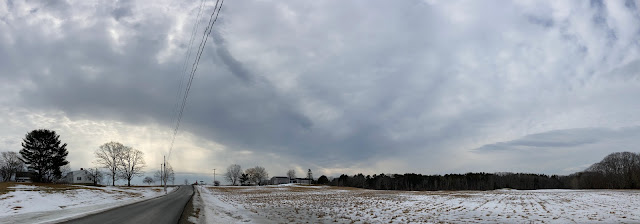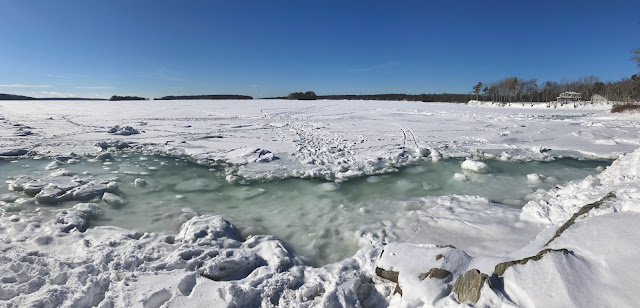Yesterday, while walking in the falling snow, which overnight had made an oppressive, black and white world from one which had been so sunny, colorful and springlike, my thoughts turned again to Ukraine. I imagined its beleaguered people trying to flee their besieged cities and towns. I imagined them bundled up for winter, having taken what essentials they could from home for who knows how long. I imagined some of them walking aimlessly in the streets and subways not knowing what to do or where to go. I imagined what it would be like for them to see and hear and feel and smell the scorched and bloody reality of invasion, war and tyranny, to worry about their futures and fear their possible demise.
Of course, that is all I could do: imagine. And then I listened to a man—a doctor and chief of the NICU in Dnipro Regional Children's Hospital in Ukraine—recount to a journalist his decision on whether to flee. He said:
My family didn't want to leave Ukraine, because we love Ukraine, and we wanted to live here happy and in peace and so on. So, I said, okay, maybe everything will be not so bad. Let's wait.
So, my main question for myself is if I made the very, very big mistake not to move from Ukraine when I had an opportunity to do this.
Either [staying] was a big mistake or not so big, and I have no answer.
I can ask you: Do you want to wake up in the morning and understand you should go—forever. Not for one day, not for two days. Forever. Can you make such a decision in, uh—I don't know—in ten minutes? My question to you. To bring just a bit of water, just a bit of food, single clothes, documents, money, and go outside your home forever. Can you make such a decision? Just imagine.
When I heard this man describe his impossible decision—while imagining what might now happen to him and his family having not fled their home while they still had the chance, while imagining what Putin and his troops would do to squash the freedoms of its neighbor, the sovereign nation of Ukraine—I was regrettably reminded of certain Americans here at home.
I recalled the sign in the deli window down the street which read, "Mandate Freedom"; though I get the gist, I wonder for whom that so-called freedom is meant to be? For chronically ill kids like Calvin? For the elderly, the immune compromised, the infirm? I wonder if the sign's author considered this when he decided to post his message in such an overt way. I wonder if he ever questions his notion of freedom. I wonder if it matters to him that freedom to do as he pleases can translate into great risk, harm and cost to others. Are we free to drive on the left side of the road? Are we free to light up a cigarette or joint in a preschool, airplane or bus? Are we free to yell "fire" in a crowded theater? No. No. No.
I continued to ponder others who protest simple public health measures as examples of tyranny, such as the wise and reasonable use of wearing masks to protect the safety and well-being of all citizens during a rampant pandemic, and to avoid overwhelming and breaking hospitals. I thought about the hackneyed and misguided gripe, Don't Tread On Me, doubting that most who embrace such a claim fully understand what it means or feels like to be truly oppressed: to be barred from speaking your native language or practicing your native religion; to have your children systematically taken from you and given to someone else because of your race; to have your land stolen; to be interned by your own government because of your race; to be shut out of and shunned from public spaces, restaurants, bathrooms, lunch counters, schools, jobs, industries and elections because of the color of your skin; to have your history and identity whitewashed and concealed so as not to risk offending the self-righteous who fear their impending delegitimization; to be subject to the real tyranny of an autocrat who would stomp on your every basic human right and freedom—speech, assembly, movement, press, religion.
Amid these contemplations, I consider my son Calvin, who is in ways one of the least-free people I know. He has no speech with which to claim his desires, needs or beliefs. He has little to no control over his movements or whereabouts. He is confined to a body which gravely restrains him, and is oppressed by a brain that regularly seizes despite being awash in toxic drugs. He is relegated to a life of limitations, injustices and miseries. And yet, he holds the moral high ground over most anyone I know.
As the snow continues to fall, each flake swirling in a different direction but ultimately touching down, I hold my feverish, shivering, feeble child in my arms in the corner of the room on the green couch. Outside, the sky is still white and the trees appear blackish. I fear Calvin will have a repeat of last night's seizures; often, they come in hard-to-control clusters as if a barrage, his brain under siege. Then, my thoughts turn again to Ukrainians, and I try to imagine what it might be like to have to take up arms to fight for the right to live freely and democratically in one's own homeland. That is real tyranny.
 |
| Kyiv, Ukraine, in the wake of Russian shelling. Photo by Emilio Morenatti/Associated Press |






